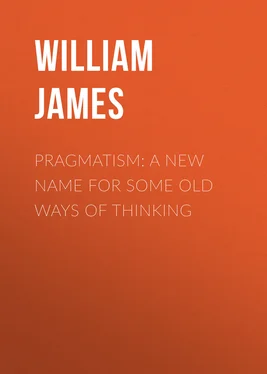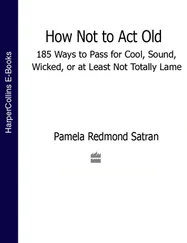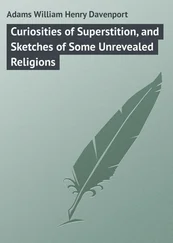William James - Pragmatism - A New Name for Some Old Ways of Thinking
Здесь есть возможность читать онлайн «William James - Pragmatism - A New Name for Some Old Ways of Thinking» — ознакомительный отрывок электронной книги совершенно бесплатно, а после прочтения отрывка купить полную версию. В некоторых случаях можно слушать аудио, скачать через торрент в формате fb2 и присутствует краткое содержание. Жанр: foreign_antique, Философия, foreign_edu, на английском языке. Описание произведения, (предисловие) а так же отзывы посетителей доступны на портале библиотеки ЛибКат.
- Название:Pragmatism: A New Name for Some Old Ways of Thinking
- Автор:
- Жанр:
- Год:неизвестен
- ISBN:нет данных
- Рейтинг книги:5 / 5. Голосов: 1
-
Избранное:Добавить в избранное
- Отзывы:
-
Ваша оценка:
- 100
- 1
- 2
- 3
- 4
- 5
Pragmatism: A New Name for Some Old Ways of Thinking: краткое содержание, описание и аннотация
Предлагаем к чтению аннотацию, описание, краткое содержание или предисловие (зависит от того, что написал сам автор книги «Pragmatism: A New Name for Some Old Ways of Thinking»). Если вы не нашли необходимую информацию о книге — напишите в комментариях, мы постараемся отыскать её.
Pragmatism: A New Name for Some Old Ways of Thinking — читать онлайн ознакомительный отрывок
Ниже представлен текст книги, разбитый по страницам. Система сохранения места последней прочитанной страницы, позволяет с удобством читать онлайн бесплатно книгу «Pragmatism: A New Name for Some Old Ways of Thinking», без необходимости каждый раз заново искать на чём Вы остановились. Поставьте закладку, и сможете в любой момент перейти на страницу, на которой закончили чтение.
Интервал:
Закладка:
Leibnitz continues elsewhere: "There is a kind of justice which aims neither at the amendment of the criminal, nor at furnishing an example to others, nor at the reparation of the injury. This justice is founded in pure fitness, which finds a certain satisfaction in the expiation of a wicked deed. The Socinians and Hobbes objected to this punitive justice, which is properly vindictive justice and which God has reserved for himself at many junctures. … It is always founded in the fitness of things, and satisfies not only the offended party, but all wise lookers-on, even as beautiful music or a fine piece of architecture satisfies a well-constituted mind. It is thus that the torments of the damned continue, even tho they serve no longer to turn anyone away from sin, and that the rewards of the blest continue, even tho they confirm no one in good ways. The damned draw to themselves ever new penalties by their continuing sins, and the blest attract ever fresh joys by their unceasing progress in good. Both facts are founded on the principle of fitness, … for God has made all things harmonious in perfection as I have already said."
Leibnitz's feeble grasp of reality is too obvious to need comment from me. It is evident that no realistic image of the experience of a damned soul had ever approached the portals of his mind. Nor had it occurred to him that the smaller is the number of 'samples' of the genus 'lost-soul' whom God throws as a sop to the eternal fitness, the more unequitably grounded is the glory of the blest. What he gives us is a cold literary exercise, whose cheerful substance even hell-fire does not warm.
And do not tell me that to show the shallowness of rationalist philosophizing I have had to go back to a shallow wigpated age. The optimism of present-day rationalism sounds just as shallow to the fact-loving mind. The actual universe is a thing wide open, but rationalism makes systems, and systems must be closed. For men in practical life perfection is something far off and still in process of achievement. This for rationalism is but the illusion of the finite and relative: the absolute ground of things is a perfection eternally complete.
I find a fine example of revolt against the airy and shallow optimism of current religious philosophy in a publication of that valiant anarchistic writer Morrison I. Swift. Mr. Swift's anarchism goes a little farther than mine does, but I confess that I sympathize a good deal, and some of you, I know, will sympathize heartily with his dissatisfaction with the idealistic optimisms now in vogue. He begins his pamphlet on 'Human Submission' with a series of city reporter's items from newspapers (suicides, deaths from starvation and the like) as specimens of our civilized regime. For instance:
"'After trudging through the snow from one end of the city to the other in the vain hope of securing employment, and with his wife and six children without food and ordered to leave their home in an upper east side tenement house because of non-payment of rent, John Corcoran, a clerk, to-day ended his life by drinking carbolic acid. Corcoran lost his position three weeks ago through illness, and during the period of idleness his scanty savings disappeared. Yesterday he obtained work with a gang of city snow shovelers, but he was too weak from illness and was forced to quit after an hour's trial with the shovel. Then the weary task of looking for employment was again resumed. Thoroughly discouraged, Corcoran returned to his home late last night to find his wife and children without food and the notice of dispossession on the door.' On the following morning he drank the poison.
"The records of many more such cases lie before me [Mr. Swift goes on]; an encyclopedia might easily be filled with their kind. These few I cite as an interpretation of the universe. 'We are aware of the presence of God in His world,' says a writer in a recent English Review. [The very presence of ill in the temporal order is the condition of the perfection of the eternal order, writes Professor Royce ('The World and the Individual,' II, 385).] 'The Absolute is the richer for every discord, and for all diversity which it embraces,' says F. H. Bradley (Appearance and Reality, 204). He means that these slain men make the universe richer, and that is Philosophy. But while Professors Royce and Bradley and a whole host of guileless thoroughfed thinkers are unveiling Reality and the Absolute and explaining away evil and pain, this is the condition of the only beings known to us anywhere in the universe with a developed consciousness of what the universe is. What these people experience IS Reality. It gives us an absolute phase of the universe. It is the personal experience of those most qualified in all our circle of knowledge to HAVE experience, to tell us WHAT is. Now, what does THINKING ABOUT the experience of these persons come to compared with directly, personally feeling it, as they feel it? The philosophers are dealing in shades, while those who live and feel know truth. And the mind of mankind-not yet the mind of philosophers and of the proprietary class-but of the great mass of the silently thinking and feeling men, is coming to this view. They are judging the universe as they have heretofore permitted the hierophants of religion and learning to judge THEM. …
"This Cleveland workingman, killing his children and himself [another of the cited cases], is one of the elemental, stupendous facts of this modern world and of this universe. It cannot be glozed over or minimized away by all the treatises on God, and Love, and Being, helplessly existing in their haughty monumental vacuity. This is one of the simple irreducible elements of this world's life after millions of years of divine opportunity and twenty centuries of Christ. It is in the moral world like atoms or sub-atoms in the physical, primary, indestructible. And what it blazons to man is the … imposture of all philosophy which does not see in such events the consummate factor of conscious experience. These facts invincibly prove religion a nullity. Man will not give religion two thousand centuries or twenty centuries more to try itself and waste human time; its time is up, its probation is ended. Its own record ends it. Mankind has not sons and eternities to spare for trying out discredited systems...." [Footnote: Morrison I. Swift, Human Submission, Part Second, Philadelphia, Liberty Press, 1905, pp. 4-10.]
Such is the reaction of an empiricist mind upon the rationalist bill of fare. It is an absolute 'No, I thank you.' "Religion," says Mr. Swift, "is like a sleep-walker to whom actual things are blank." And such, tho possibly less tensely charged with feeling, is the verdict of every seriously inquiring amateur in philosophy to-day who turns to the philosophy-professors for the wherewithal to satisfy the fulness of his nature's needs. Empiricist writers give him a materialism, rationalists give him something religious, but to that religion "actual things are blank." He becomes thus the judge of us philosophers. Tender or tough, he finds us wanting. None of us may treat his verdicts disdainfully, for after all, his is the typically perfect mind, the mind the sum of whose demands is greatest, the mind whose criticisms and dissatisfactions are fatal in the long run.
It is at this point that my own solution begins to appear. I offer the oddly-named thing pragmatism as a philosophy that can satisfy both kinds of demand. It can remain religious like the rationalisms, but at the same time, like the empiricisms, it can preserve the richest intimacy with facts. I hope I may be able to leave many of you with as favorable an opinion of it as I preserve myself. Yet, as I am near the end of my hour, I will not introduce pragmatism bodily now. I will begin with it on the stroke of the clock next time. I prefer at the present moment to return a little on what I have said.
Читать дальшеИнтервал:
Закладка:
Похожие книги на «Pragmatism: A New Name for Some Old Ways of Thinking»
Представляем Вашему вниманию похожие книги на «Pragmatism: A New Name for Some Old Ways of Thinking» списком для выбора. Мы отобрали схожую по названию и смыслу литературу в надежде предоставить читателям больше вариантов отыскать новые, интересные, ещё непрочитанные произведения.
Обсуждение, отзывы о книге «Pragmatism: A New Name for Some Old Ways of Thinking» и просто собственные мнения читателей. Оставьте ваши комментарии, напишите, что Вы думаете о произведении, его смысле или главных героях. Укажите что конкретно понравилось, а что нет, и почему Вы так считаете.












